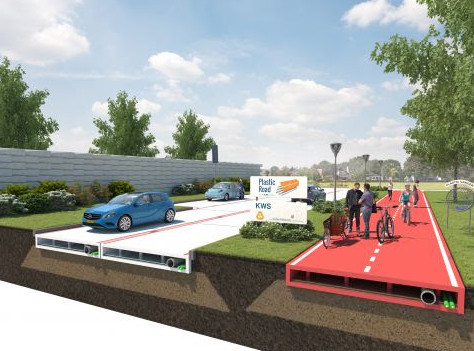Dutch company launches plan for recycled plastic roads
 Dutch company KWS Infra is developing a new sort of road made from recycled plastic. This, the company says, will not only cut down on plastic waste but reduce CO2 output from road building and usage, and make roads more sustainable and safer. Esther O’Toole reports.
Dutch company KWS Infra is developing a new sort of road made from recycled plastic. This, the company says, will not only cut down on plastic waste but reduce CO2 output from road building and usage, and make roads more sustainable and safer. Esther O’Toole reports.
An estimated eight billion tons of plastic is floating around in the oceans and 55% of our plastic waste is still incinerated. Innovative Dutch companies have been busy looking at feasible ways of fishing the plastic out of the sea and shipping it to shore. Now KWS Infra, part of the VolkerWessels construction group and the biggest road builder in the Netherlands, has come up with a plan to turn that kind of plastic waste into roads.
The roads themselves would be made from prefab sections prepared offsite from 100% recycled plastic and brought en masse to the building site, with road markings and guard rails already in place. Being light weight and easy to transport they could take months off construction times.
The fabric is thought to be more durable than asphalt and needs little or no maintenance, being weather proof and impervious to weeds. The other major advantage is that they are hollow allowing space for piping, electric cables and – another hot topic for VolkerWessels – internet connections.
Internet
VolkerWessels is now investing in multiple projects for urban renewal and connected city innovation, including placing internet receivers along roads, be they antennas and masts or embedded in street lights and wind turbines. Plastic roads fit into this picture perfectly. If the space inside the decking could also be used to house net connectors, losing reception in a tunnel would become a thing of the past.
Driverless cars, cheap and affordable ones too, will be on the open market as early as next year. What benefits will be reaped from these innovative technologies when they begin to converge? With uninterrupted mobile internet connections along all main highways, a long commute could be set to become the most productive part of the day.
No wonder then that VolkerWessels is not having trouble garnering interest for their projects. Rotterdam city council was the first to show interest in piloting the PlasticRoad, in early July.
Interest
Since then the company has had interest from cities all over the world and are looking to finalise partnerships with plastics and recycling experts soon, spokesman Anne Koudstaal told DutchNews.nl. The aim is to have a team in place by December and to run a feasibility pilot within three years.
‘We are feeling very positive about it,’ he said. ‘All the good reactions [to July’s announcement] are a huge boost for us and the idea. It makes it all seem so much more realisable.’
If all goes to plan, the roads themselves may in turn be recyclable. This would bring PlasticRoad completely in line with the ‘cradle to cradle’ notions of the circular economy being implemented by other innovative ideas such as The Ocean Clean Up Project and the Plastic Madonna art project.
The Netherlands, despite being one of the smallest countries in the developed world by land mass, has one of the highest carbon footprints per capita; especially in relation to fossil fuel use and cement production. Cutting emissions related to road usage and building would seriously reduce that footprint. Especially when one considers that the road network in the country covers approximately 135,470 km and most of it is tarmacked.
Thank you for donating to DutchNews.nl.
We could not provide the Dutch News service, and keep it free of charge, without the generous support of our readers. Your donations allow us to report on issues you tell us matter, and provide you with a summary of the most important Dutch news each day.
Make a donation